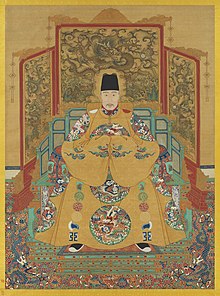
Back جيا جينغ Arabic الامبراطور جياجينج ARZ چیاچینگ AZB Jiajing Catalan Gă-cêng Huòng-dá̤ CDO Ťia-ťing Czech Jiajing German Ĝiaĝing Esperanto Jiajing Spanish چیاچینگ Persian
| Jiajing Emperor 嘉靖帝 | |||||||||||||||||
|---|---|---|---|---|---|---|---|---|---|---|---|---|---|---|---|---|---|
 | |||||||||||||||||
| Emperor of the Ming dynasty | |||||||||||||||||
| Reign | 27 May 1521 – 23 January 1567 | ||||||||||||||||
| Enthronement | 27 May 1521 | ||||||||||||||||
| Predecessor | Zhengde Emperor | ||||||||||||||||
| Successor | Longqing Emperor | ||||||||||||||||
| Prince of Xing | |||||||||||||||||
| Tenure | 15 April 1521 – 27 May 1521 | ||||||||||||||||
| Predecessor | Zhu Youyuan, Prince Xian of Xing | ||||||||||||||||
| Born | 16 September 1507 Anluzhou, Huguang Province, Ming dynasty | ||||||||||||||||
| Died | 23 January 1567 (aged 59) Palace of Heavenly Purity, Forbidden City, Beijing, Ming dynasty | ||||||||||||||||
| Burial | Yong Mausoleum, Ming tombs, Beijing | ||||||||||||||||
| Consorts | |||||||||||||||||
| Issue Detail | |||||||||||||||||
| |||||||||||||||||
| House | Zhu | ||||||||||||||||
| Dynasty | Ming | ||||||||||||||||
| Father | Zhu Youyuan | ||||||||||||||||
| Mother | Empress Cixiaoxian | ||||||||||||||||
| Chinese name | |||||||||||||||||
| Chinese | 嘉靖帝 | ||||||||||||||||
| |||||||||||||||||
The Jiajing Emperor (16 September 1507 – 23 January 1567), also known by his temple name as the Emperor Shizong of Ming, personal name Zhu Houcong, art names Yaozhai,[1][a] Leixuan,[2][b] and Tianchi Diaosou,[3][c] was the 12th emperor of the Ming dynasty, reigning from 1521 to 1567. He succeeded his cousin, the Zhengde Emperor.
Zhu Houcong was born as a cousin of the reigning Zhengde Emperor, so his accession to the throne was unexpected. However, when the Zhengde Emperor died without an heir, the government, led by Senior Grand Secretary Yang Tinghe and the Empress Dowager Zhang, chose Zhu Houcong as the new ruler. However, after his enthronement, a dispute arose between the emperor and most of the officials regarding the method of legalizing his accession. The Great Rites Controversy was a major political problem at the beginning of his reign. After three years, the emperor emerged victorious, with his main opponents either banished from court or executed.
The Jiajing Emperor, like the Zhengde Emperor, made the decision to reside outside of Beijing's Forbidden City. In 1542, he relocated to the West Park, located in the middle of Beijing and west of the Forbidden City. He constructed a complex of palaces and Taoist temples in the West Park, drawing inspiration from the Taoist belief of the Land of Immortals. Within the West Park, he surrounded himself with a group of loyal eunuchs, Taoist monks, and trusted advisers (including Grand Secretaries and Ministers of Rites) who assisted him in managing the state bureaucracy. The Jiajing Emperor's team of advisers and Grand Secretaries were led by Zhang Fujing (張孚敬), Xia Yan, Yan Song, and Xu Jie in succession.
At the start of the Jiajing Emperor's reign, the borders were relatively peaceful. In the north, the Mongols were initially embroiled in internal conflicts. However, after being united by Altan Khan in the 1540s, they began to demand the restoration of free trade. The emperor, however, refused and attempted to close the borders with fortifications, including the Great Wall of China. In response, Altan Khan launched raids and even attacked the outskirts of Beijing in 1550. The Ming troops were forced to focus on defense. The conflict only came to an end after Jiajing's death, when the new Ming emperor Longqing allowed trade to resume.
In the Jiajing era, Wokou pirates posed a significant threat to the southeastern provinces of Zhejiang, Fujian, and Guangdong for several decades. The Ming authorities attempted to address this issue by implementing stricter laws against private overseas trade in the 1520s. However, piracy and related violence continued to escalate throughout the 1540s and reached its peak in the 1550s. It was not until the 1560s, particularly after 1567 when the Longqing Emperor relaxed laws against maritime trade with foreign countries, that the problem began to be gradually suppressed.
In 1556, northern China was struck by a devastating natural disaster—the deadliest earthquake in human history, with its epicenter in Shaanxi. The earthquake claimed the lives of over 800,000 people. Despite the destruction caused by the disaster, the economy continued to develop, with growth in agriculture, industry, and trade. As the economy flourished, so did society, with the traditional Confucian interpretation of Zhuism giving way to Wang Yangming's more individualistic beliefs.
However, in his later years, the emperor's pursuit of immortality led to questionable actions, such as his interest in young girls and alchemy. He even sent Taoist priests across the land to collect rare minerals for life-extending potions. Unfortunately, these elixirs contained harmful substances like arsenic, lead, and mercury, which ultimately caused health problems and may have shortened the emperor's life.
- ^ Shen, Defu (1619). Wanli yehuo bian 萬曆野獲編 [Compilation of Wanli era catastrophes] (in Chinese). Vol. 1.
又云世宗號堯齋。
- ^ Shen, Defu (1619). Wanli yehuo bian 萬曆野獲編 [Compilation of Wanli era catastrophes] (in Chinese). Vol. 1.
又,嘉靖二十三年,內廷施藥於外,其藥有『凝道雷軒』之印,傳聞『雷軒』上道號也。
- ^ Shen, Defu (1619). Wanli yehuo bian 萬曆野獲編 [Compilation of Wanli era catastrophes] (in Chinese). Vol. 1.
世宗自號天池釣叟,在直詞臣各賦詩,惟興化李文定一時最當聖意,即今所傳『拱極眾星為玉餌,懸空新月作銀鉤』者是也。
Cite error: There are <ref group=lower-alpha> tags or {{efn}} templates on this page, but the references will not show without a {{reflist|group=lower-alpha}} template or {{notelist}} template (see the help page).